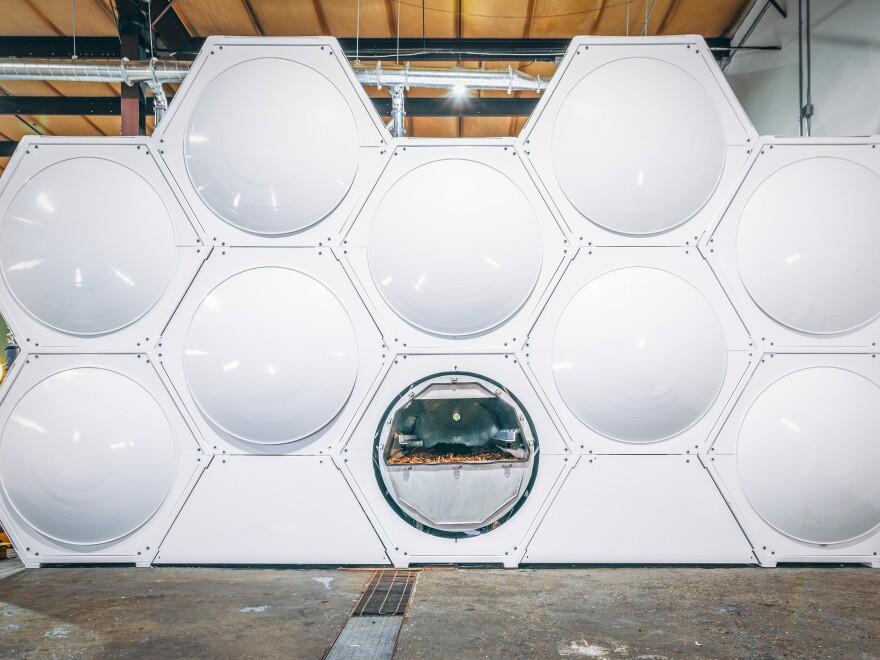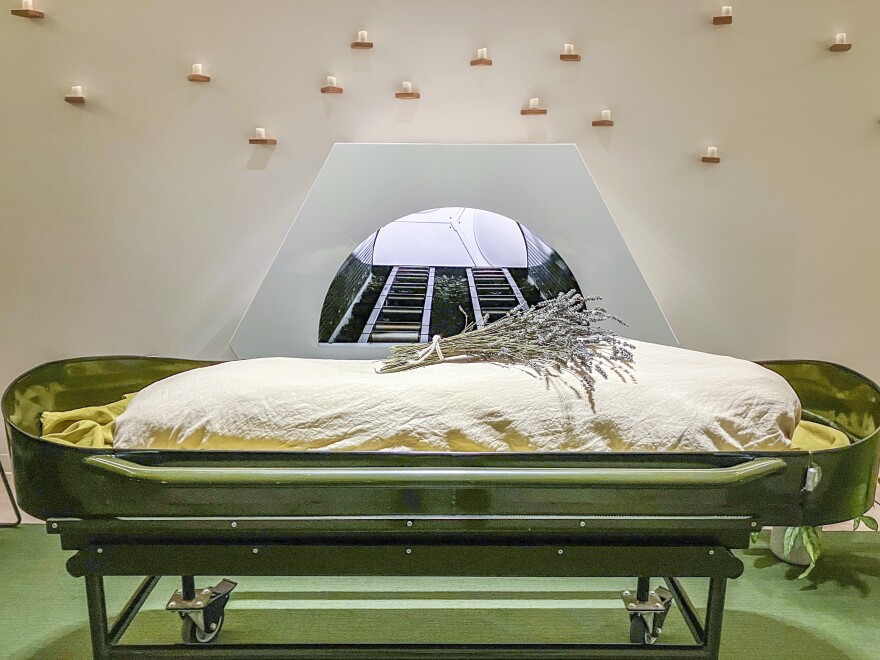When Dennis Cunningham was diagnosed with terminal cancer, he wanted his death to reflect the values he lived by. As a civil rights lawyer, Cunningham defended the Black Panthers, AIDS protestors, and later, environmental activists from Earth First.
"He was a profound environmentalist," his son, Joe Mellis, said.
In his spare time, Cunningham built sculptures out of driftwood, bottle caps, and rusted car parts in his backyard studio in San Francisco. He wanted his body to be part of that same cycle of decay and regeneration.
He instructed his kids to have him composted after he died.
"It was totally in keeping with who he was to not make waste, but to use waste," said Cunningham's daughter, Miranda Mellis.
To Cunningham, being turned into soil and spread on the forest floor to fertilize new trees was much more appealing than being burned to ash or entombed in a concrete vault underground.
A growing number of Americans are likewise eager to see more environmentally friendly alternatives to conventional burial and cremation. Human composting is the latest option.
But not everywhere, or even in most states. When Cunningham died on March 5, 2022, at his son's house in Los Angeles, it wasn't an option there.
"It's literally illegal to compost a body in the state of California," said his son Joe Mellis. "We had to transport his body from California to Washington to do this."
Seven states have legalized human composting to date, including Washington, Oregon, Colorado, Nevada, Vermont, and New York. It took California lawmakers three tries to pass a law to do the same, but it won't take effect until 2027.
Opposition has mainly come from religious institutions that consider human composting "undignified," and which highlight the scarcity of research proving the practice is safe and environmentally beneficial.
Lawmakers have championed the legislation, nonetheless, arguing that a natural process of decomposition is inherently better than burning fossil fuels for cremation, harvesting rainforest mahogany to make coffins, or spraying pesticides across cemetery lawns.
A new kind of funerary business
Cunningham ended up at Recompose, a human composting facility in Seattle. Founder and CEO Katrina Spade said about 15% of their clients are shipped from California and another 14% from other states.
"We pick them up at Sea-Tac," she said, referring to Seattle-Tacoma International Airport.

Walking into the lobby of Recompose feels like walking into a spa. Meditation music whispers from hidden speakers. Living art tapestries decorate the walls; earthy green and yellow shades cover the windows.
"When the light comes through, we hope it reminds you of the forest light," Spade said, while walking through the Gathering Space, a ceremonial room where families can hold services and rituals for their loved ones.
The science of human composting
The composting itself happens in a cavernous warehouse that Spade calls the greenhouse. She describes the smell as alternating between that of a grassy meadow after a rain and a barnyard. Inside the warehouse, 34 white hexagonal cylinders, or individual vessels, are stacked on top of each other, forming the shape of a beehive.
When a new body comes in, the staff lay it inside one of the vessels on a bed of wood chips, alfalfa, and straw, Spade said, then they cover it with more of the same.
"If you were alive, it would probably be a little itchy," Spade said.
Microbes and bacteria go to work on the body, a natural process that generates heat, raising the temperature inside the vessel to 150 degrees Fahrenheit. Under Washington state regulations, this natural heat has to be sustained for three straight days to kill off any pathogens that otherwise might contaminate the soil.

"Seven or eight years I've been doing this, and still, when I see that temperature spike, I think, 'Holy mackerel!'" Spade said, channeling her inner 8th-grade science fair nerd. "It just feels like some sort of miracle, even though it is nature."
The body stays in the vessel for about 30 to 40 days. Every week or so, the staff rotate it to let air through and the body transforms and consolidates into a cubic yard of dark brown dirt, enough to fill the bed of a pickup truck.
The staff removes any titanium hips or knees left over in the process, then grinds the bones down to sand and mixes them back in with the soil.
The entire process takes about two months and costs about $7,000 — more than the cost of cremation, but less than a full service conventional burial with cemetery plot, according to data collected by Funeralocity, a consumer website.
Environmentally, Spade argues, composting is way better than both, because of all the resources it does not use by comparison, such as fossil fuels, rainforest wood, or land. When she asked environmental engineer Troy Hottle to crunch the numbers, he found composting saves more than a metric ton of carbon compared to the alternatives.
Another study by Dutch researchers at Leiden University, also commissioned by Recompose, found similar environmental benefits to composting.
Human compositing inspires innovation — and opposition
During the deadliest period of the COVID-19 pandemic, so many people were being cremated in California, the emissions violated local air district rules, according to state Assemblymember Cristina Garcia, a Democrat from Bell Gardens.
This is part of what inspired her to carry a bill to legalize human composting in California, AB 351. It passed the state legislature in 2022 and will take effect in 2027, giving regulatory agencies time to prepare.
"The pandemic exacerbated the situation and reminded us of the importance of the choices we make throughout our life cycle," Garcia told KQED after the bill was signed into law. "It added a sense of urgency."
It took three tries, across three legislative sessions, for lawmakers to pass the bill, even though the opposition to human composting was minimal and tepid.
The California Catholic Conference raised concerns about the safety of composted human remains, pointing out that supporters of the bill relied on just one small, non-peer-reviewed study from Recompose to contend that all toxic elements of the body, like dental implants or chemotherapy treatments, were properly eliminated.
The bishops also argued that composting a human body and scattering the remains was undignified. It "risks people treading over human remains without their knowledge," the Catholic Conference wrote in a statement, "while repeated dispersions in the same area are tantamount to a mass grave."
But Recompose's Spade says her company has composted many Catholics.
"We've had priests bless the body before," she said. "We've had priests bless the soil after."
Some liberal-leaning rabbis have also considered how human composting can comply with Jewish death care rituals, and "some are even creating liturgy, or creating words to say around these kinds of processes," according to Courtney Applewhite, who studied religious responses to human composting during her doctoral research at UC Santa Barbara.
After composting: resting places and rituals
Composting helped Joe and Miranda Mellis grieve after their dad died. Most of his soil was spread on the floor of a forest in Southwest Washington. Another portion went under a beloved hemlock tree on his family's land in Michigan.
Some of the kids kept some compost for themselves. Joe has a box in his home office in Los Angeles. Miranda buried some in the woods behind her house in Olympia. In Washington, human compost can be spread anywhere as long as the landowner says it's okay. California plans to follow suit.
"This tree is a vine maple," Miranda said, as she dodged a spider web and ducked under the low, thin mossy branches arching out in all directions, a spot she chose because it feels "parental."

She knelt next to a little altar she built over the roots, tending a small bowl of rocks and shells her father collected and a jagged crystal, surrounded by a ring of pinecones.
"I meditate here and sometimes I talk to him here. I think of this as like a telephone booth to the afterworld," she said. "I can just hear him as if he's sitting right next to me."
Having her father here, the sense of his body giving back to the earth, it all somehow mitigated the pain of the loss, she said. It made her less afraid of her own mortality.
"After all of this, I thought, 'I think I want to do it, too,'" she said.
Both Miranda and Joe say they also want to be composted when they die.
This story comes from NPR's health reporting partnership with KQED and KFF Health News.
Copyright 2024 KQED. To see more, visit KQED.

